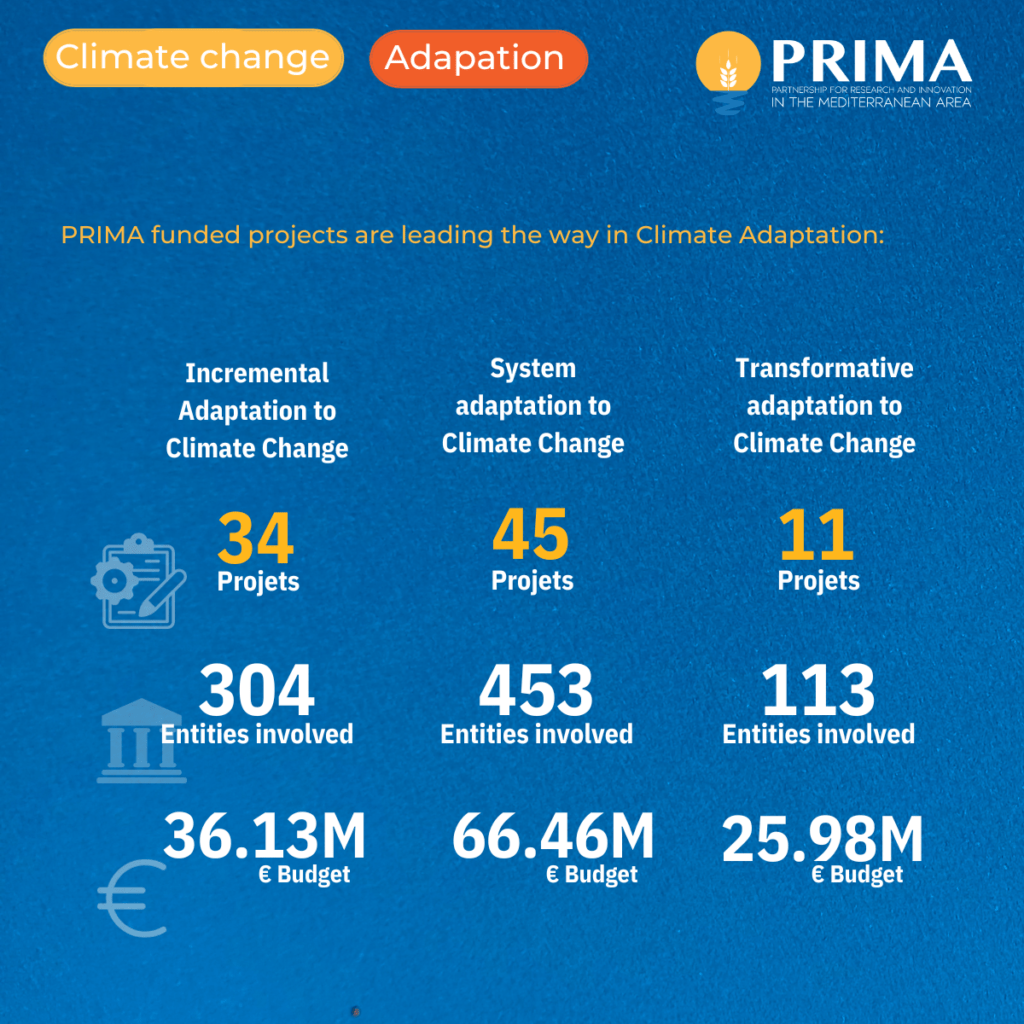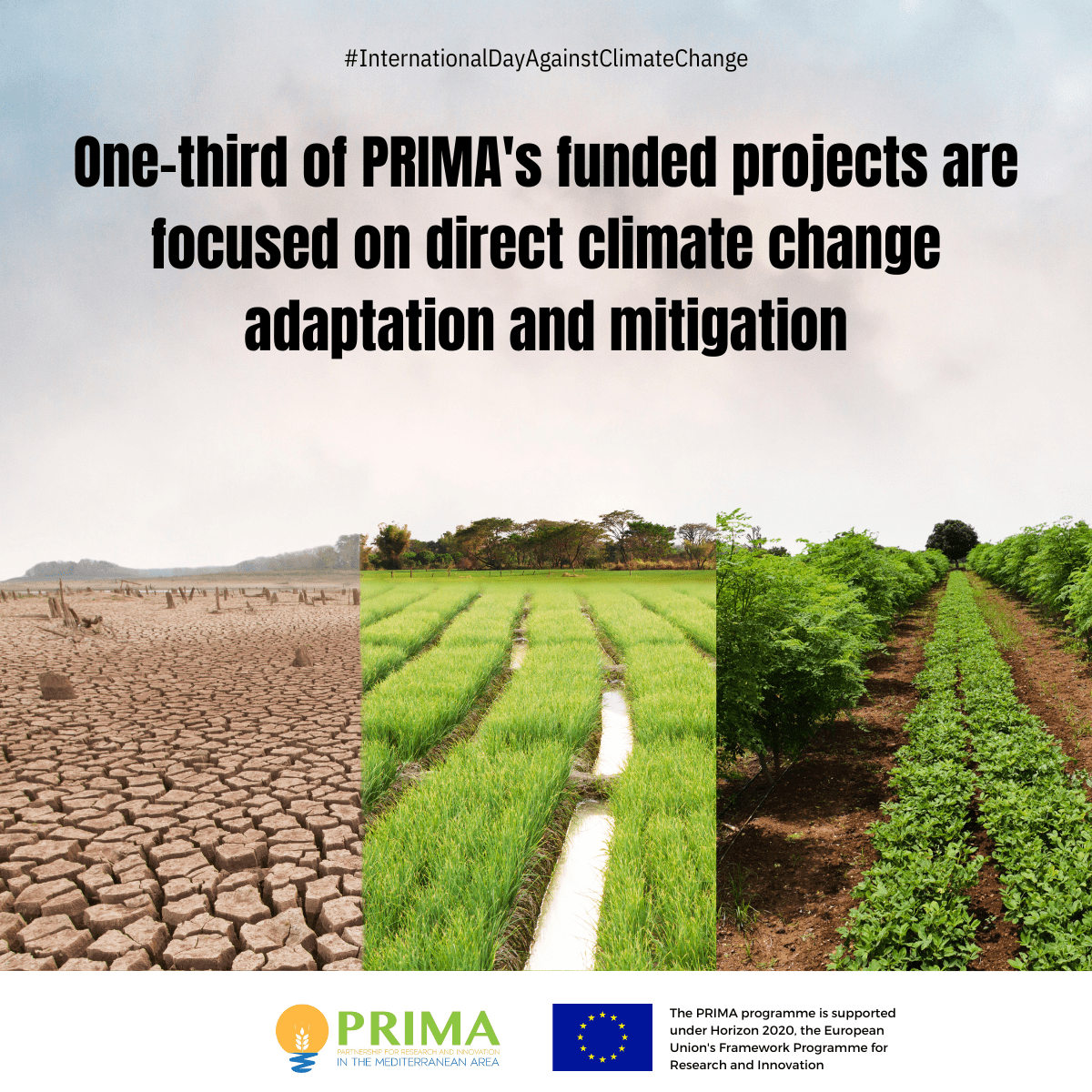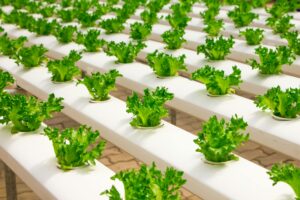While a significant portion of PRIMA-funded projects directly address climate change adaptation and mitigation (around one-third of PRIMA funded projects), PRIMA’s primary focus revolves around a dual aspects of adaptation to climate change.
Mitigation involves reducing greenhouse gas sources and enhancing sinks, aiming to prevent their release into the atmosphere and mitigate climate change’s impact. Adaptation, conversely, entails adjusting natural or human systems to respond to current or anticipated climatic changes, to moderate harm caused by climate change.
As the world comes together to mark the International Day Against Climate Change, we focus on the vital role of research and innovation in adapting farming systems to the challenges presented by our changing climate. In the Mediterranean region, these challenges are particularly acute, with prolonged droughts, rising temperatures, and extreme weather events threatening the stability of traditional farming practices that have sustained the region’s culture and economy for centuries.
Why Research and Innovation on adaptation of Farming Systems to Climate Change matters
The Mediterranean region is especially susceptible to the adverse impacts of climate change. These challenges jeopardize the traditional farming practices that form the bedrock of the region’s identity and economic stability. To safeguard these practices and mitigate the climate’s impacts, research and innovation are indispensable. Climate-resilient agricultural strategies, including drought-resistant crop varieties, improved irrigation methods, agroecological practices, and sustainable land management techniques, are crucial. These innovations not only contribute to global food security but also reduce the environmental footprint of agriculture. Additionally, they foster economic growth and adaptability, promoting the long-term sustainability of Mediterranean agriculture in the face of an ever-changing climate.
For a comprehensive overview of PRIMA’s climate-resilient farming projects and more detailed information, please refer to the factsheet available here. Meanwhile, below, you can get a sneak peek with some exemplary examples of our initiatives
PRIMA Funded Projects: Leading the Way in Climate Adaptation

PRIMA’s projects on adaptation of farming systems to climate change can be categorized into three levels: Incremental adaptation, System adaptation, and Transformative adaptation.
1. Incremental Adaptation to Climate Change
Incremental adaptation involves making gradual, manageable adjustments to agricultural practices. PRIMA-funded projects have made significant strides in this area:
- Crop Resistant Varieties: Projects like IMPRESA have tested and identified highly heat and salt-tolerant wheat varieties, helping farmers in regions with challenging climates.
- Adjusting Irrigation and Water Management: PRIMA has supported projects in developing frugal innovations such as smart irrigation systems, which conserve water by precise monitoring and control.
- Integrated Pest Management: These projects aim to reduce reliance on chemical pesticides through biological controls and other innovative methods, promoting sustainable pest control.
2. System Adaptation to Climate Change
System adaptation represents a more comprehensive approach to tackling climate change impacts:
- Soil Management Projects: PRIMA has funded 28 projects focused on transforming soil management practices within farming systems.
- Agroecology Practices: These projects aim to diversify crops, reduce chemical inputs, and promote ecological synergy, ultimately improving agricultural sustainability.
- Agropastoral Projects: Initiatives like PAS-AGRO-PAS and SUREPASTOR seek to enhance the productivity and sustainability of agropastoral systems, benefiting Mediterranean farmers.
3. Transformative Adaptation to Climate Change
Transformative adaptation involves radical shifts in agriculture to address extreme climate challenges:
- WEFE Nexus Projects: These projects focus on the Water-Energy-Food-Ecosystems Nexus, aiming to enhance sustainability and resilience through substantial changes to existing systems.
- Agroforestry: Agroforestry strengthens farming systems’ ability to withstand extreme weather events and provides alternative income sources.
On this International Day Against Climate Change, we celebrate PRIMA’s unwavering commitment to climate-resilient farming systems. Climate change may pose significant challenges, but with dedication, innovation, and collaboration, we can build a more resilient and sustainable future for the Mediterranean and beyond.
A look at:
Definition :
- Mitigation: An anthropogenic intervention to reduce the sources or enhance the sinks of greenhouse gases (IPCC, 2001a).
- Adaptation: Adjustment in natural or human systems in response to actual or expected climatic stimuli or their effects, which moderates harm or exploits beneficial opportunities (IPCC, 2001a).




